- Home
- Patrick E. Andrews
The Long-Knives 6 Page 3
The Long-Knives 6 Read online
Page 3
“Even a cold meal sounds good,” Whitlow muttered. “It’s been a long time since noon.”
“Ye’ll see to yer weapons first,” O’Callan commanded. “The little darlin’s have been out in this dusty weather all day and they want cleanin’. Wait up! I don’t want ever’ man-jack cleanin’ his carbine at the same time. It’d be a perty sight to see a war party chargin’ down on us an’ us sittin’ with our Springfields broke apart in our laps. We’ll do it one man at a time, with the others on alert. Then we’ll eat an’ settle down fer the night. I’ll give ye the guard detail after chow.”
The recruits grinned at each other about O’Callan’s old-maidish wariness. “Maybe we shoulda brung that cannon by the flagpole with us,” Taylor snickered.
“Now that’s a grand idee!” O’Callan agreed. “But I didn’t think any o’ you rookies knew which end of it the ball come out. Now shut yer yaps and clean them weapons. We’ve still a ways to go on this trip.”
Three
Old eyes, though ones sharp as they had ever been, took in the rising column of dust long before the blue suited forms crested the ridge and began the long downward grade to Painted Rock Crossing. Licking his lips in anticipation of company, Mexico Shultz made ready to welcome them.
The sun had climbed to high noon when O’Callan and his patrol reined up at the tie-rail in front of the shack that sagged behind the protection of a low piñon log stockade. O’Callan gave the command to dismount and swung from his own blister maker.
“Well, damn my eyes, if it ain’t Terry O’Callan,” Mexico brayed in greeting. There was a stirring behind O’Callan, and both men turned in time to watch as Taylor broke ranks ahead of the order and rushed to the nearby well casing. “What’s got into him? Looks like he ain’t had a drink in a week.”
“He might as well not had. The green young fool drained his canteen by midday yesterday and us without a drop to spare him.” O’Callan addressed his next remarks to the troopers. “All right, dis-missed! Fill yer canteens and tend to yer mounts. ’Tis the end o’ the line. An’, Taylor ... don’t be fer drinkin’ too fast or ye’ll get sick.”
“It’s right good to see ya again, Terry,” Shultz went on.
“An’ good to be here again, old friend. Do ye, by any chance, happen to have a small nip inside?”
Mexico grinned at his friend. “You know I do. You figure that trooper’s learnt his lesson?”
O’Callan nodded and gave his friend a sly wink. They walked toward the door now, ignoring the activity of the men behind them. Terry O’Callan laid a friendly hand on Mexico’s shoulder. “If’n he didn’t, the next class session might be the death of him. Now, let’s see to slakin’ me own thirst.”
Painted Rock Crossing was a stockaded property of the Butterfield stage line, managed by the one-eyed, whiskery old codger named Mexico Shultz. Mexico acquired that sobriquet because he had spent so much time trading and stealing in that country. He spoke Spanish fluently and had a passable working knowledge in a couple of Indian dialects. He managed the crossing and his crew with an iron hand, and didn’t trust anyone who didn’t drink at least a quart of whiskey a day. He held O’Callan in particular esteem.
No actual crossroads existed at Painted Rock Crossing, nor any ford of a river. It was a convenient meeting place for the stagecoach, prospectors, ranchers or anyone else who wanted to conduct business in the area. It had several wells within its walls and lay close to the foothills, where a poor grade of timber was available. With both the palisades and the water it could withstand a siege for any length of time while the attacker would eventually go thirsty.
The Apaches left the place alone, except to fire a few frustrated shots at the ramparts while passing to and from Mexico.
The inside walls of the waiting room were covered with carved obscenities in English and Spanish, and this generally caused some embarrassment for the lady passengers of the Butterfield line. When any of them deemed it their duty to complain of these offenses to their eyes, Mexico Shultz would simply say, “Why, ma’am, I don’t read too good myself so I ain’t right sure what them words say. But if’n I could read and I found somethin’ distasteful, why, dang it all, I don’t think I’d just sit and read ever’ word that was writ there.”
Even if it didn’t cool their indignation, it at least cut the conversation short and that was what Mexico wanted anyway.
While O’Callan’s men stabled the horses and the mule, he and Mexico sat at one of the rough-hewn tables in the waiting room and began working on the station’s whiskey supply. “How’s come they keep sendin’ ya over here so often, O’Callan?”
“Because we’re a half-strength regiment with details fer a full-up one. If I ain’t sergeant o’ the guard, then I’m trainin’ the recruits. An’ when it ain’t one o’ them duties, I’m on the mail run. So here I am again. Say! Are ya sure that’s enough whiskey fer the two o’ you?”
Mexico patted his friend’s shoulder reassuringly. “Don’t you worry. My supplies came in with the last stage. I’m stocked up good, even got enough fer a cavalry sergeant or two.”
“Mexico, ye’re a’ oasis of kindness in this terrible cruel world. When I git me discharge and own me own little saloon, I promise it’ll be a haven away from yer troubles. Are ye sure ye’re not Irish?”
“Nope. I’m from Arizona Territory, born and bred,” Mexico offered. “But I’m gonna drink whiskey like an Irishman in that bar of yours. By the way, when you figurin’ on headin’ back?”
“In the mornin’. I’d like to stay another day, but there’s some transfers and a promotin’ or two in this mail, so me darlin’ colonel’s in a rush to read it all.”
“It might be a good thing if you waited a while. The ’Paches hit a ranch south o’ here yesterday. The Olsen place it was. They burnt it down and kilt six, from what I heard. There’s supposed to be about a dozen or so of ’em and they ain’t went back to Mexico yet.
O’Callan nodded grimy. “Those killin’s include some youngsters, no doubt?” Mexico lowered his head in silent reply. “Are ye sure they was from Mexico? Couldn’t be that Halcon was stirrin’ up things again?”
“You got a point there, O’Callan. Halcon’s a bad one at best. No heart in him at all. He couldn’t love hisself, let alone care much for a white man.”
“Now that makes things interestin’,” O’Callan opined. “Would ye have any idee where they might be skulkin’ about?”
Mexico poured himself another drink. “A prospector come through here early this mornin’ an’ told me he’d seen sign north of Dogleg Butte. That puts ’em right smack dab between here and your fort.”
“We didn’t see anythin’ of ’em.”
“Mebbe not, but there’s a chance they seen you or come acrost your trail by now. Once they figger out you ain’t scoutin’ fer a bigger group, they’ll be waitin’ fer ya, O’Callan. They know you’re goin’ back to where you come from.”
“No matter, if there’s but twelve or so of ’em.”
“Under normal conditions you could probably outfight or outrun ’em,” Mexico agreed. “But them soldier boys of yours look kinda young to me.”
“Soljers! The wee brats are recruits.”
“They been in a fight yet?”
O’Callan shook his head. “Only in the barracks. But if their first fight is to be here, then here it’ll be.” The two older men were interrupted by the banging door as the recruits entered the waiting room. “Dammit!” O’Callan swore. “When are ye goin’ to develop the habit o’ doin’ things quietly? It’ll keep ye alive a lot longer out here.”
Whitlow ignored the sergeant’s outbreak of temper. “We’ve seen to the horses and mule, Sergeant. May we eat now?”
O’Callan reached behind him to the haversack hanging on the chair and pulled out some folded papers. He flipped them over to Mexico. “Here’s a’ authorization fer the payment of our chow. But tomorrow’s breakfast is gonna be a mighty light meal. A man’s eyes and ears are a lot sh
arper when his belly ain’t full.”
“What’s on the menu, mister?” Taylor asked.
“Coffee, bacon, tortillas and frijoles.”
“What’s free-holies?”
“Beans, boy,” Mexico told him, getting up. “Mexican beans, that is. Best damn beans in the world. That’s the way the mexicanos judge their womenfolk. By the way they cook frijoles and make love ... but not necessarily in that order. Sit down, soljers, your grub’s ready.”
The five men ate without talking, as men will when hungered by hard outdoor-activity. Mexico sat a bowl of hot peppers out in the center of the table, but only he and Charlie Bradley ate the fiery food. They pushed their plates away after finishing the meal and the two or three inevitable cigars were produced for an after-dinner smoke. Mexico belched loudly and patted his belly contentedly.
“Spent much time in Mexico, Bradley?” the stationmaster inquired.
“Some,” Charlie answered.
“I figgered so,” Mexico declared. “I could tell by the way you ate them chiles and used your tortillas for silver wear.”
“There was a lot of vaqueros around Texas where I worked. If you spend enough time with those Mexican cowboys, you pick up things from ’em.”
“An’ what about fightin’ Injuns?” O’Callan interrupted. “Have ye learned somethin’ o’ that durin’ yer long and eventful life?”
“Never fought ’em, Sergeant O’Callan,” Charlie admitted. “We always gave ’em a few head o’ beef when we passed through their country. They generally let us be.”
“Well, bucko, ye might jest have need fer a cow or two tomorrow. Mexico tells me that there’s about twelve o’ the heathen devils waitin’ out there to make our journey home a lively affair.”
Mexico nodded. “From what I hear, they musta been keepin’ a close eye on you or your trail since yesterday sometime.”
Whitlow grinned. “I imagine that the next time Taylor goes on patrol he will take along that cannon by the flagpole.”
Taylor was on his feet. “You callin’ me yellow, Whitlow?”
Whitlow stood up, fists ready. “Anyway you want to take it is fine with me.”
“Keep yer fists to yerselves!” O’Callan bellowed. “Now sit down. I’ve no desire to go into a fight with a couple o’ little lads all wore out from hittin’ each other. I want ye all to rest and take it easy this afternoon. Right after supper tonight I’ll let ye have no more than three whiskeys, then into yer bedrolls. We’re leavin’ while it’s still dark in the mornin’, and with luck we’ll avoid our friends out there. If not, ye’ll be real soljers by day after tomorrow.”
The two young troopers sat down sullenly as Mexico went for more liquor. O’Callan smiled to himself and happily sipped his whiskey as the day wore on.
~*~
Supper over, the troopers off to bed down in the communal dormitory at the rear of the adobe building, Mexico found O’Callan on the front porch. His chair tilted back as he gazed at the clear, cold desert sky. The old man heaved a contented sigh as he sat down on a hard wooden bench.
“Well, your boys is hard asleep fer the night. Now ya kin tell me the latest news from Fort Perdido.”
“Ever’thing’s still the same, Mexico. Fort Dawson is as dull as an old maid’s tea.”
“Is the colonel’s wife persistin’ in tryin’ to grow them delicate Eastern flowers in this godforsaken place?”
“Right ye are. Dear soul, she tries so hard an’ no one has the heart to tell her ’tis all fer naught.”
“So true, so true,” Mexico said, scrubbing vigorously at the itchy stubbled on his cheeks. “And what about her husband, Colonel Patterson? Any news about his gainin’ that star?”
“Ye know as well as I that’s never destined to be. A general in the United States Army is expected to pursue the enemy aggressively. I’m afraid the good colonel is more interested in the intimate relations of the maguey cactus worm or the great horned-bill snipe.”
“Still wrapped up in his natural-history discoveries, is he? Well, good enough fer a scientifical feller or them professor types back East. So I suppose it’s up to you sergeants to hold the regiment together.”
“Not us! We leave the holdin’ o’ the regiment to the sergeant major. Harry MacDonald’s a hard man with an iron grasp of the military way to do things, but for all o’ that, he’s a fair man. I’ve never known him to do a lad wrong. Least ways, not one who wasn’t deservin’ o’ what he got.”
“Ya like him a lot, hey?”
“As sergeant majors go, yes. When I finally hang up my McClellan fer good an’ take me proper station in life as a gentleman saloonkeeper, I’d be proud to have Harry MacDonald as me first customer.”
“Just when do you figger on this retirement of yours?”
“Any day now, any time. It’s just that with Halcon on the loose, it don’t seem fittin’ or proper at the moment.”
“Oh, hell, O’Callan! You’ll be in the cavalry till the day they plant ya six feet under,” Mexico laughed.
O’Callan wasn’t considered a religious man, nor did he see himself as superstitious like the old country Irish, but Mexico’s last remark sent a chill up his spine. He crossed himself quickly.
“Sure an’ don’t ye know ’tis bad luck to be talkin’ to a man about his grave? I’ve help enough to enter Hell with a two-day journey back to Fort Dawson without your assistance, I’ll thank you.”
“What? The meanest jasper of the Arizona Territory afraid of a little harmless joshin’?”
“Enough o’ that,” O’Callan responded gruffly. He hadn’t meant it to be taken all that seriously, only now he was beginning to believe it himself. He gave an impatient snort and took another long pull from the bottle.
“And your pal, Brannigan? How’s he doin’?” Mexico skillfully changed the subject. “He’s still holdin’ his stripes?”
“Ye bet he is,” the fierce little Irishman snapped. “Why, Jimmy an’ me go back so far we don’t even remember the first fight we had together. He’s a fine lad ... fer a foreigner.”
“A foreigner! And just what do ya call yourself?”
“Me? Why, the devil take it, man, I was born in New York City.”
“Out here, that’s about as foreign as you can get.” Wheezing with laughter, Mexico bade O’Callan a good night and went back inside.
~*~
It was dark and cold the next morning as O’Callan’s patrol shivered and stamped feet for warmth. Mexico shook hands with O’Callan. “Take care of yourself,” he urged. “I slipped them bottles fer you and Brannigan in with the mail. If you’re real careful they shouldn’t git broke.”
“I’ll be like I was treadin’ through a powder magazine, Mexico,” O’Callan promised. Then he turned his attention to the recruits. He would take no chances, and he personally checked gear and saddles before leading them off into the desert once again.
His final inspection covered the weapons, and he was even more critical than usual. The troopers huddled deep into their greatcoats and waited impatiently as their sergeant made the last minute adjustments himself with a promise to them that they would do them all again themselves when they got back to Fort Dawson.
“Gather ’round them, buckos,” O’Callan whispered. “From here on out I want ye to talk just like meself. We’ll whisper as if we were at a dear friend’s funeral. Now it may be true that a cavalryman has certain advantages over the infantryman. He can go further, faster, and with a lot less fatiguin’ physical labor.
“But the infantryman’s got the advantage when the enemy’s close at hand. He can be quiet. A cavalryman can be quiet, too, but his horse don’t cooperate along those lines. The big dumb darlin’ brute can’t help but stomp his hoofs and give out with a snort now and again. So we’ll have to be doubly quiet to make up fer the animals’ natural noisiness.
“There'll be no unnecessary talkin’ or rattlin’ o’ yer gear—and that goes fer daylight hours, too. It’ll take us a bit longer to git bac
k to Fort Dawson, since we’re not goin’ the same way we took to git here. I never follow the same trail twice in Injun country and ’tis a habit ye could do well to adopt.”
O’Callan was interrupted by the bright glow of Taylor’s match as he lit a cigar. The sergeant’s hand shot out and knocked it from his mouth.
“Hey! What’d you do that for, Sarge?” Taylor demanded.
“The glow of a match can be seen fer miles in this clear desert air, ye ignorant pup! There’ll be no smokin’ except durin’ daylight.” The young recruit stepped back involuntarily from the anger in O’Callan’s eyes.
O’Callan pulled a plug of chewing tobacco from his shirt pocket. “Use this if ye hunger fer a smoke, lads. The safest way to use tobacco is to chew when it’s dark in hostile country. We’re gonna stick close together durin’ the ride because we’ll need firepower to bear if we’re ambushed. Bradley’ll ride a ways ahead of us on point. If there’s any trouble, ye ride back to us as quick as ye can. Ready? Right, let’s mount up ... and remember!—mind the noise.”
The little patrol waved a final goodbye to Mexico Shultz and left Painted Rock Crossing, starting out into the desert. Charlie began leading them east of their original trail, as he had been instructed by O’Callan. The carrot-topped sergeant bit off a chaw of his tobacco and loosened the carbine in its saddle scabbard. He smiled to himself when he noticed
Whitlow and Taylor do the same, but he snapped a whispered order to them.
“Keep yer eyes out there and not on me. I’m not the one lookin’ fer yer scalps.”
They again alternated riding and walking the horses during the day. The men took off their greatcoats and strapped them to their saddles as the desert sun increased its heat. O’Callan called frequent rest halts when he noticed their heads drooping despite the threat they faced. He watched with some satisfaction when they automatically went on guard during these breaks. O’Callan merely grunted to himself and gave each of them one of the cigars he had bought at the crossing.
Their day grew monotonous and uncomfortable, yet no one complained. Bradley remained out on the point, and wisely kept within sight and paid strict attention to O’Callan’s arm and hand signals. O’Callan maintained his position in the rear, knowing that no matter how keen and alert a recruit might become, he remained a recruit and would forget to look behind him every once in a while.

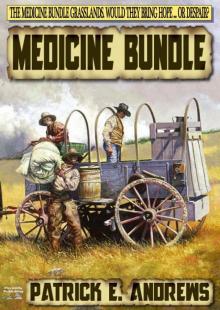 Medicine Bundle
Medicine Bundle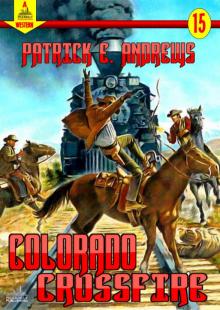 Colorado Crossfire
Colorado Crossfire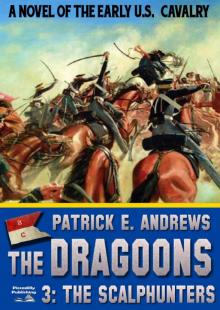 The Dragoons 3
The Dragoons 3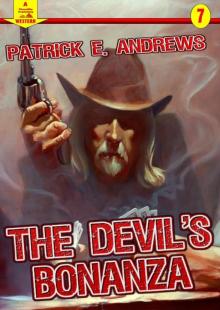 The Devil's Bonanza (A Piccadilly Publishing Western Book
The Devil's Bonanza (A Piccadilly Publishing Western Book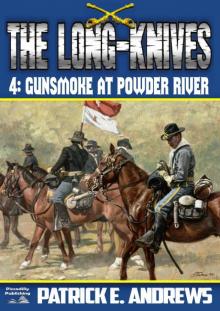 Gunsmoke at Powder River (The Long-Knives #4)
Gunsmoke at Powder River (The Long-Knives #4)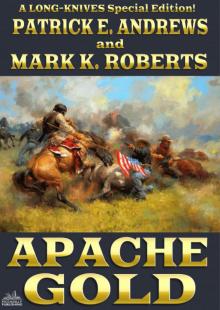 The Long-Knives 6
The Long-Knives 6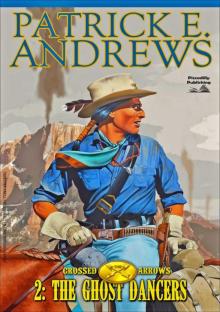 The Ghost Dancers (A Crossed Arrows Western Book 2)
The Ghost Dancers (A Crossed Arrows Western Book 2)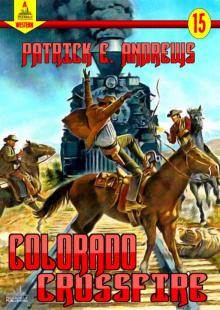 Colorado Crossfire (A Piccadilly Pulishing Western Book 15)
Colorado Crossfire (A Piccadilly Pulishing Western Book 15)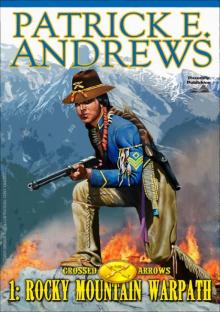 Rocky Mountain Warpath (A Crossed Arrows Western Book 1)
Rocky Mountain Warpath (A Crossed Arrows Western Book 1)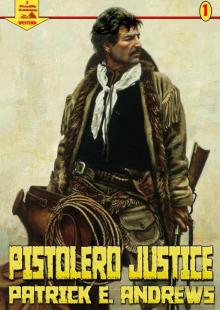 Pistolero Justice (A Piccadilly Publishing Western
Pistolero Justice (A Piccadilly Publishing Western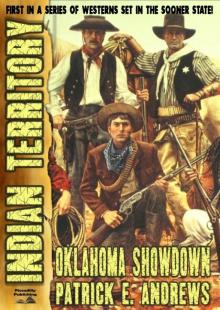 Oklahoma Showdown (An Indian Territory Western Book 1)
Oklahoma Showdown (An Indian Territory Western Book 1)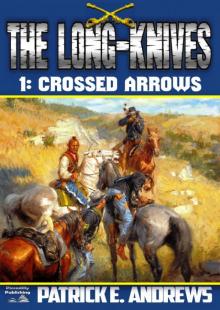 Crossed Arrows (A Long-Knives Western Book 1)
Crossed Arrows (A Long-Knives Western Book 1)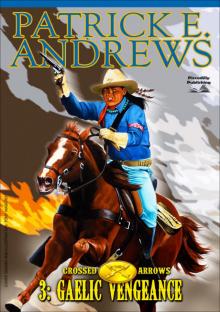 Crossed Arrows 3
Crossed Arrows 3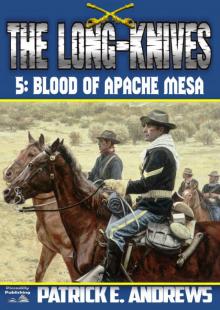 Blood of Apache Mesa
Blood of Apache Mesa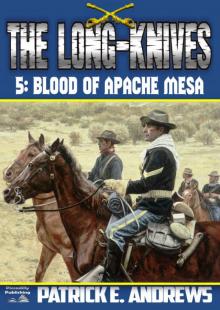 The Long-Knives 5
The Long-Knives 5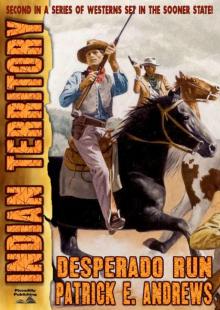 Desperado Run (An Indian Territory Western Book 2)
Desperado Run (An Indian Territory Western Book 2)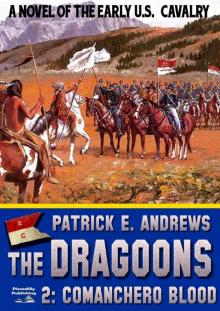 Comanchero Blood (A Dragoons Western Book 2)
Comanchero Blood (A Dragoons Western Book 2)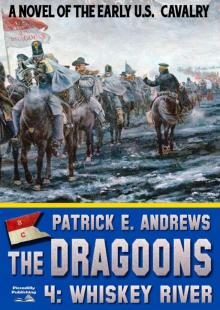 The Dragoons 4
The Dragoons 4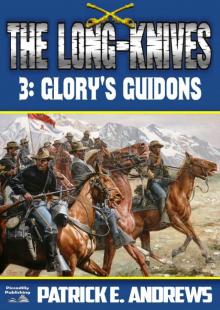 Glory's Guidons (The Long-Knives US Cavalry Western Book 3)
Glory's Guidons (The Long-Knives US Cavalry Western Book 3)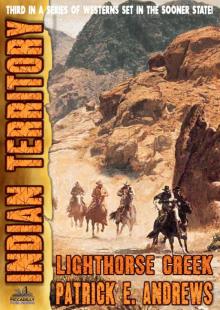 Indian Territory 3
Indian Territory 3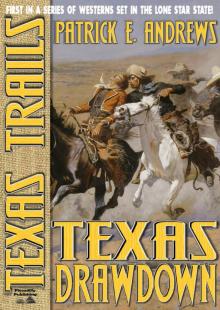 Texas Trails 1
Texas Trails 1